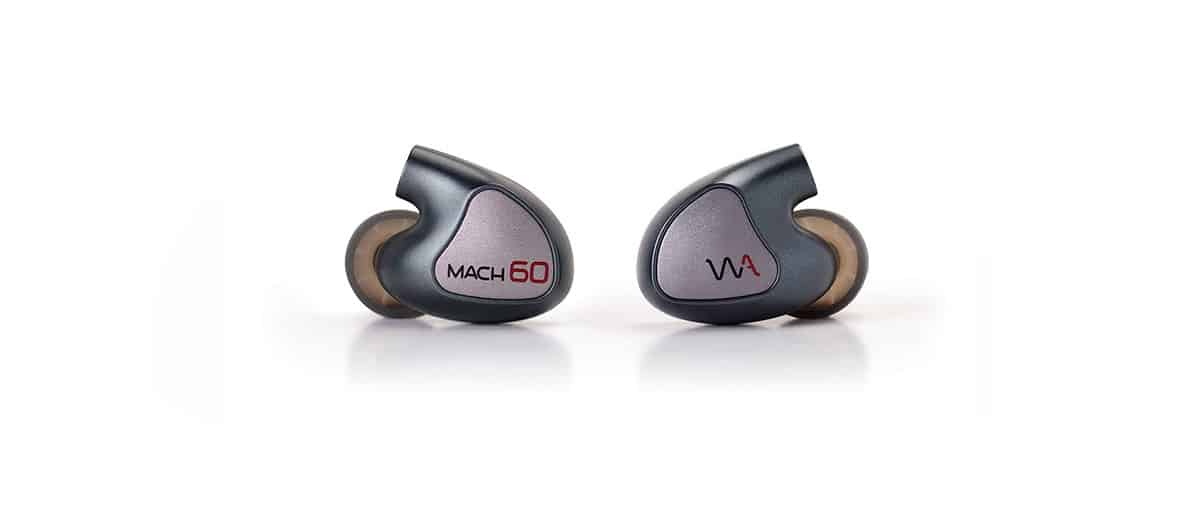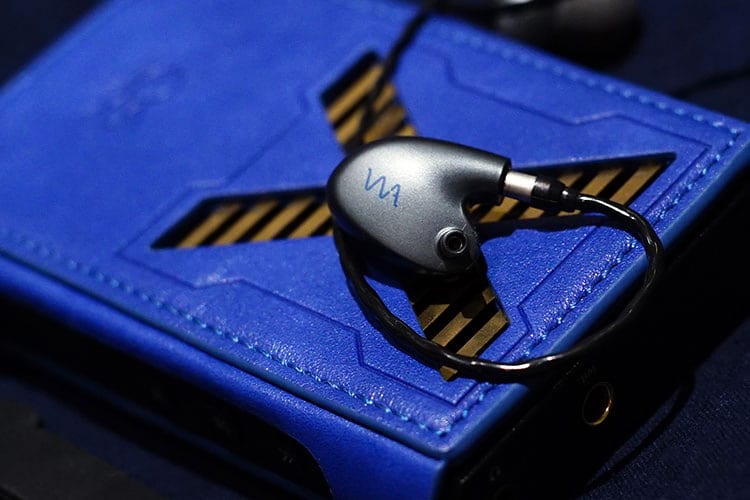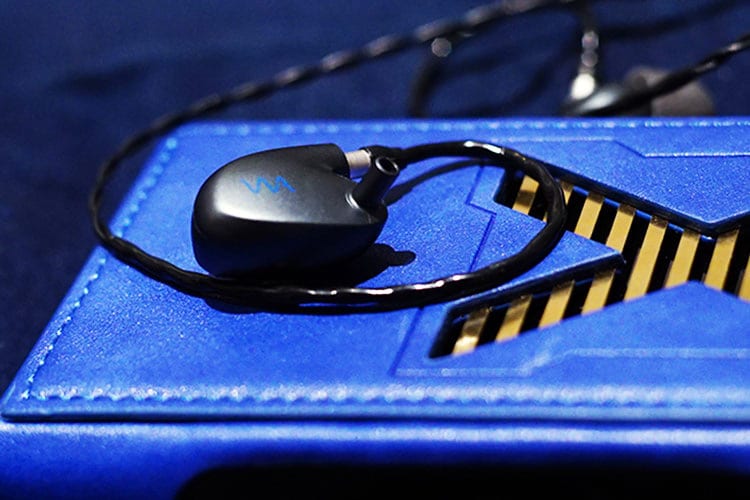In today’s article, we have an in-depth review of the new Westone Audio MACH 60 which is a high-end universal IEM using a 6 BA driver design. It is priced at £1099.
Disclaimer: This is a sample that was sent in exchange for our honest opinion. Headfonics is an independent website that does not have any affiliate links. We thank both HiFi Headphones UK and Westone Audio for this opportunity.
To learn more about Westone Audio gear we have previously featured on Headfonics you can click here.
Note, that this article follows our latest scoring guidelines which you can read up on here.
Just a few weeks ago we have covered Westone Audio’s top-of-the-list “Premium Reference” model MACH 80, followed by the flagship model MACH 70 of the “Premium Bass” product line which has one less bass driver down the hood.
This time we have the MACH 60, the sub-flagship model for the “Premium Reference” line which comes with a much stealthier LINUM cable in black, a different color scheme, and with very different specifications. It offers plenty of energy and excellent fidelity within the same tiny chassis.
Tech Highlights
The MACH 60 uses 6 balanced armature drivers in a proprietary configuration featuring 2 lows, 2 mids, and 2 tweeters using a 3-way passive crossover design that covers the frequency range 8Hz – 20kHz.
It subtracts 2 drivers from MACH 80’s design, slimming down from 4 tweeters to 2, and is rated at 35Ω in impedance and 100dB @1kHz in sensitivity.
One key difference you may have spotted would be the SuperBaX stock cable on the MACH 60 which measures just 0.75Ohms, slightly higher than MACH 80’s ULTRABaX cable which is 0.6Ohms in impedance.
Westone Audio has moved onto the T2 connector system which is IP-67 waterproof and has a robust build, at the same time it complements the high-strength, small-in-gauge cable cores.
Design
At first glance, I thought the whole MACH series look the same, but that is not true.
The MACH 60 is after a more “sci-fi” color palette – still metallic but definitely gives it a more vibrant, playful look than the very serious MACH 70 and MACH 80 in a deeper blueish-grey tone.
The rest is similar, the housing combines a metallic covering on a light profile, rigid polycarbonate housing with a satin finish, garnished with a new logo design that matches the product ID design.
On the belly there is a small and extended nozzle, the extrusion angle is very comfortable for any ears. Along with its small body size and you can easily get a good seal without the need for adjustments. All parts are molded with good quality and feel very sturdy in the hand.
Factoring in the color scheme on the cable, the MACH 60 feels much more modest in design than its bigger brothers that have a premium appearance. This makes it more professional looking and suitable for stage use or post-processing works.
Comfort & Isolation
As you would expect, the MACH 60 checks a lot of boxes in terms of comfort and isolation. The whole system is extremely compact and light in weight and there is very little stress from the cable which is also extremely light unlike most stock cables with upper-tier IEMs nowadays.
I am not against the fact that thicker cables feel more premium and may sound better, but the LINUM cables with T2 connectors are very well executed and convincing in transparency. The lack of weight and slimmer low-profile design also make it look a little less geeky.
Tips
The lavish selection of tips, on the other hand, provides the finishing touch to the excellent fit and isolation. Looking closely you can see the tips being more extruded than normal and this enhances passive noise isolation.
The material feels premium to the touch and it flexes and bends to the ear canal shape to shield off noise almost completely. At the same time, they share some of the IEM’s weight and let them sit weightlessly on the cavum.
Inside the MACH 60 package, you will find 5 pairs of silicone flanges and 5 pairs of Westone Audio’s high-density True-fit foams. Different sizes are supplied for users to find their best fit and the foams of high density could easily seal off ambient noises, it is as quiet as wearing a custom monitor when you put on the MACH 60 with foam tips.
There is some audible difference in the low end when using the foams, where the bass is more elaborated in decay and the perceived bass reaches even further down. On the silicone flanges, it sounds more balanced and tighter, giving a stronger sense of control.
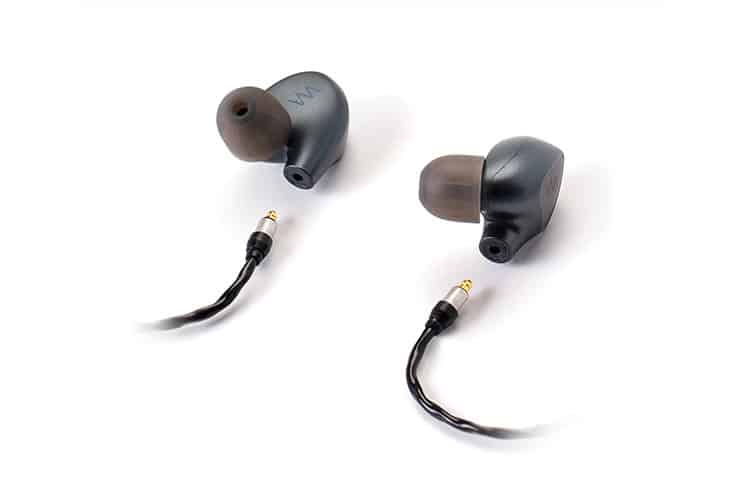
Stock Cable
The MACH 60 comes with the LINUM ESTRON SuperBaX cable with a resistance rating as low as 0.75Ωs, aiming at reducing coloration combined with a stealthy and lightweight design.
The cable is terminated with the T2 connector system and comes with an intuitive slider mechanism that allows you to lock it at any position easily, even at the back of the neck.
As a result, there is no unwanted microphonics and the cable fits perfectly on the system in terms of look and without hindering the user’s agility.
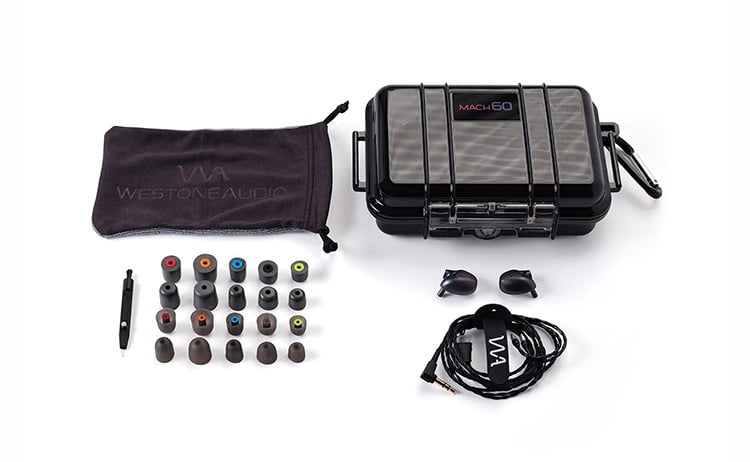
Packaging & Accessories
The MACH 60 comes with quality prints and a practical set of accessories which includes the 10 pairs of tips we mentioned above. Aside from that, Westone Audio packs in a crushproof, watertight carrying case made by Pelican, suitable for heavy-duty or pro-use with plenty of space to snap your name tag on.
Aside from all those accessories, you will also find a cable binder preinstalled, a cleaning stick with a brush, and a cloth bag that can let you slide your IEMs in and avoid them from bouncing in the case.
Sound Impressions
In case you have already forgotten, the MACH 60 is the sub-flagship down the “Premium Reference” line in the MACH series, positioned just below the MACH 80 while the MACH 70 is a completely different beast leaned to the bassier side.
There is a similar but not as strong tendency for the MACH 60 to focus more on the bass than the treble, but the feeling is not as strong as on the MACH 70.
The MACH 60 requires quite a bit of power to shine, and when it does it has even energy distribution throughout the audio spectrum and it could sound lush, punchy, and swiftly articulated.
There is a significant difference in the way it handles the treble, which feels less elevated and sharp when paired with a neutral-sounding output, somehow coloring the MACH 60 more mellow and rich in tone.
The MACH 60 doesn’t stress the transients and upper midrange like the MACH 80, and such makes it feels “more reference”. It also has better synergy with sharper-sounding gears that are more unpolished or boosted in the upper register.
Higher gain and power will color the output sharper and more intense in the treble. However, there is good tolerance to strong dynamics where the MACH 60 never struggles to remain balanced sounding when listening with different gear and tested with various genres of music.
Bass
With one more bass driver than the MACH 70, the MACH 60 sounds more controlled and deeper instead of pumping out big bouncy bass. It is safe to assume two smaller balanced armatures are used instead of one big bass driver that moves more air, so we are getting more accurate, responsive, and controlled bass.
The MACH 60 lives up to its positioning as a reference IEM, with a satisfactory sub-bass presence that is not overly emphasized or rolling off too early.
The calmly responsive and deep bass is right on point, with decent layering and details. Being just slightly colored and decently weighted, the mid-bass will probably be your focus as the treble is not as projected.
Testing with Daft Punk’s Random Access Memories album on the RME ADI-2 Pro connected to my MAC, the bass attacks strong and steadily with moderate speed followed by a clean decay.
The synthesized bass is quite energetic and you can hear it kicking deep though the MACH 60 maintains a good sense of control whilst not overly stressing the bass which doesn’t color it too warm for a reference IEM.
Mids
The mids are something really similar between the MACH 60 and MACH 80, both are smoothly articulated and with satisfactory fullness and definition to sound lush but not fat, also allowing the overtones of instruments with a resonance chamber to be easily heard.
Steady throughout the midrange, the MACH 60 does not overly emphasize the presence of vocals or the higher plucks on string instruments, which further strengthens the sense of control.
It is quite similar to when you are in a dampened piano room or an acoustically treated mixing room where the absorbers take away the reflections and allow you to listen to more details under higher sound intensity.
I guess that is what the mixing engineers or stage performers would love to hear having any excessive coloration taken away for an authentic and more revealing midrange presentation.
Treble
The treble is smooth and extended, though voices may not sound very upfront since the upper vocal range is not that lifted. The transients and the 5kHz range aren’t as protruding as many other IEMs tuned to impress the crowd, and it may take some time for the ears to get used to the less protruded and unaltered treble tuning.
The less protruded treble range on the MACH 60 allows better focus on the whole picture and the lower register. The tuning dims down percussions and enhances the tolerance to protruding voices and high-pitched instruments in the mix.
Though it doesn’t sound very exciting when it comes to big ensembles, especially with woodwinds and violins, the sense of coherence and control brought by this tuning allows the listener to hear more details across the spectrum simultaneously and more effortlessly.
In most cases, the MACH 60 is spike-free, but it does not roll off very early and still manages to capture good air in the very higher frequency range.
The overtones of the snare and hi-hat are still very clear and the air for piano and high-pitched vocals are also well presented. It could easily please those who hate crashing cymbals or loud guitars and prefer tranquility over energy and dynamics.
On an additional note, the tuning is fatigue-free having some of the treble spike regions flattened, which makes the MACH 60 more ideal for long hours of listening and music editing work.
Staging
The headroom on the MACH 60 is more confined than with the MACH 80 which is brighter in tone and more resolving in the upper mids region. It feels like listening in a controlled listening environment that treats and absorbs the lows and highs.
Being dampened doesn’t mean that it rolls off and narrows down the stage. The bass actually feels darker, controlled especially when testing with explosive bass tracks that threaten the dynamics, while the treble is capable of handling very intense levels of drumming and sopranos.
The vocal gets good attention on the MACH 60 and has a distinctly shaped body, positioned slightly in front of the head with good thickness and holds together a clear, stereographic image.
Other instruments are satisfactorily separated from each other and intimately spaced from the listener as if you are listening right in front of the band in a small hall, with every instrument and the vocalist playing their part.

